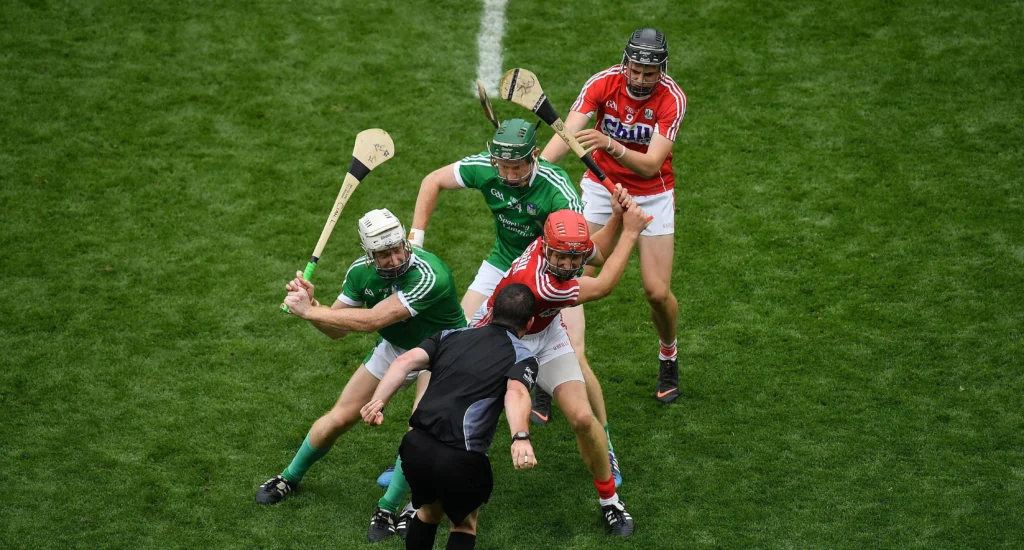The Gaelic Athletic Association (GAA) has a long and storied history of organizing the All Ireland Senior Hurling Championships, which dates back to 1887. This makes it one of the oldest and most prestigious hurling competitions in the world. Throughout the years, the championship has captured the attention of fans and players alike, showcasing the highest level of skill and athleticism in the sport. It’s important to note that the only interruption to this longstanding tradition occurred in 1888 due to an American invasion tour. All-Ireland Senior Hurling Championships | Team Performance.
The All-Ireland Senior Hurling Championship has a rich and captivating history, firmly establishing itself as a revered and highly anticipated event in Ireland. It serves as a prestigious platform for top-tier hurling teams from all regions of the nation to showcase their skill and compete for excellence at the highest level of the sport. With its origins dating back to the year 1887, the championship boasts a venerable and enduring legacy, exemplified by Tipperary’s groundbreaking triumph as the first victors of the competition. The All-Ireland Senior Hurling Championship stands as the pinnacle of hurling excellence on the island of Ireland, embodying the passion, tradition, and spirit of the sport.
Teams representing counties from across the Irish provinces, such as the formidable Kilkenny, Tipperary, and Galway squads, engage in intense and high-stakes clashes as they vie for dominance. Led by skillful, passionate, and determined athletes, these teams compete fiercely for the honor of raising the revered Liam MacCarthy Cup, a prestigious symbol of national triumph. This championship captivates fans all over the country, with each match adding to the vibrant and storied legacy of Irish hurling, showcasing the sport’s deep-rooted traditions and intense rivalries.
Beginning of Championship
The All Ireland Senior Hurling Championship marks a pioneering era in Irish sporting history, showcasing the rich cultural significance of the sport. Traditionally, teams engage in a series of intense matches spanning the months of July and August, leading up to the grand championship final held in July. The victorious team is honored with the prestigious Liam MacCarthy Cup, a symbol of their remarkable achievement in the championship.
The All-Ireland Championship has traditionally employed a direct elimination format throughout its history. In this format, participating teams are at risk of being knocked out of the competition if they lose a match. This adds an element of high stakes and pressure to each game, as the consequences of a loss are significant, and teams must perform at their best to advance further in the championship.

As the peak, the hurling teams from counties nationwide step onto the respected pitches. The championship turns into a charming spectacle, blending the artistry of skillful hurlers with the furious rivalries that characterize provincial challenges. All-Ireland Senior Hurling Championships | Team Performance.
With the backdrop of historic venues and the notorious Croke Park hosting pivotal clashes, the championship captures the collective creative mind of the country.
The knockout format adds an element of unpredictability and creates a thrilling story for the game. This annual hurling show is a simple sport, embodying a cultural celebration that joins communities and generations.
Provincial pride becomes the dominant focal point as traditional powerhouses clash in intense battles, and belonging that extends beyond the playing field. The All Ireland Senior Hurling Championships beginning isn’t simply a sport but a powerful stitching of skill, passion, and tradition that penetrates Ireland’s cultural heritage.
Divisions of the Tournament
Below are the 4 stages of this championship:
- Preliminary Quarter Final
- Quarter Final
- Semi-finals
- Final
The preliminary quarter-final stage of the tournament comprises two matches that kick-start the thrilling competition. The third-positioned groups from the Leinster and Munster titles play the Joe McDonagh Cup champions and runners-up. At this stage, two teams get eliminated while the champions/winners move forward to the quarter-finals.
The quarter-finals are comprised of two matches each, and winners from the preliminary quarter-finals are matched up with the Leinster and Munster runners-up to form the quarter-final pairs. Teams that might have already met in the provincial titles are separated into isolated quarter-finals. At this stage, Two teams are eliminated, while the victors advance to the semi-finals.
The victors/winners of the quarter-finals join the Leinster and Munster champions to make up the semi-final pairings. Whenever feasible, teams that have previously competed in provincial championships are kept apart in separate semi-finals. This practice is implemented to ensure a fair and impartial competition and to prevent any potential conflicts of interest At this stage, two teams face elimination, while the champions progress to the final.
In the ultimate showdown, the two most deserving teams that made it to the semi-finals will lock horns in the championship final.
Sponsorship
Since 1995, various sponsors have supported this tournament. Below are the details of their sponsorship:
- The Guinness Hurling Championship: In 1995-2007, Guinness sponsored this tournament.
- The GAA Hurling All-Ireland Championship: In 2008-2009, RTE Sport, Etihad Airways, and Guinness sponsored this tournament.
- The GAA Hurling All-Ireland Championship: The tournament held between 2010-2012 was proudly sponsored by Centra, Etihad Airways, and Guinness.
- The GAA Hurling All-Ireland Championship: In 2013-2016, Liberty Insurance, Etihad Airways, and Centra sponsored this tournament.
- The GAA Hurling All-Ireland Championship: In 2017-2019, Centra, Littlewoods Ireland, and Bord Gais Energy sponsored this tournament.
Managers of the Team
A team manager plays a crucial role in every game. They are responsible for training the team, selecting the best players, and sourcing new talent from the club championship. One great example of a successful team manager is Brian Cody, who led the Kilkenny team to an impressive 11 title wins. In 2000, they won their first title/championship.
Team Titles
Below are the performances of all teams striving to win titles in this All-Ireland Championship senior league:
Kilkenny (36)
A surprising number of All-Ireland victories characterizes Kilkenny’s performance in the championship. The individual in question has brought home a total of 36 All-Ireland Senior Hurling Championships and has been a runner-up on 29 occasions. He dominated the position on top and won the first title in 1904.
Cork (30)
Cork has a rich and celebrated history in the All-Ireland Senior Hurling Title. The team performed consistently and was a strong contender, contributing essentially to the game’s legacy in Ireland. He brought home 30 All Ireland Senior Hurling Championships and was runner-up 20 times. He dominated the position on top and won the first title in 1890.
Tipperary (28)
Tipperary has marked its presence in the championship with progress and determination. The team has secured different titles. Throughout his career, he was an unparalleled force in the world of hurling, bringing home an astonishing 28 All Ireland Senior Hurling Championships and emerging as runner-up 13 times. He was a true champion, dominating the top position and cementing his legacy with his first title win in 1887.
Limerick (12)
Limerick has been a terrifying presence in the All-Ireland Senior Hurling Championship, and they showed consistently a strong and competitive hurling tradition. He brought home 12 All-Ireland Senior Hurling Championships and was runner-up 9 times. In 1897, he asserted his dominance over the position from the top and clinched the very first title.
Dublin (6)
Dublin’s presentation in the hurling title has seen times of seriousness and progress. The team contends with other Leinster counties, including traditional powerhouses like Kilkenny and Wexford, for the provincial title. He brought home 6 All-Ireland Senior Hurling Championships and was runner-up 15 times. In 1889, he asserted his dominance over the position on top and claimed the first title with ease.
Find below the performance record of the team in all Ireland championship finals. The table provides an overview of the team’s performance in various championship finals.
| Hurling teams | All Ireland Senior Hurling Championships/Titles | Runner-Up |
| Kilkenny | 36 | 29 |
| Cork | 30 | 20 |
| Tipperary | 28 | 13 |
| Limerick | 12 | 9 |
| Dublin | 6 | 15 |
| Wexford | 6 | 11 |
| Galway | 5 | 20 |
| Offaly | 4 | 3 |
| Clare | 4 | 3 |
| Waterford | 2 | 6 |
| London | 1 | 3 |
